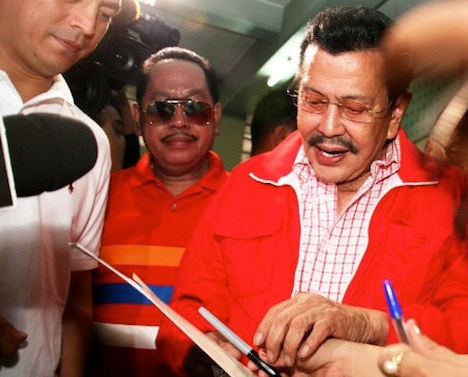Election results are still being tallied in the Philippines (painfully slowly), but it’s been clear since Monday that the results would be good news for the incumbent president, Benigno ‘NoyNoy’ Aquino III.![]()
It’s a result that was wholly expected for the Aquino administration, which is riding a crest of popularity over the fastest-growing economy in Asia (short of the Chinese economy) and over its efforts to reduce corruption in the Philippines, including a zealous effort to prosecute Gloria Macapagal-Arroyo, Aquino’s predecessor as president.
But there’s another more fundamental lesson from the elections that’s hiding in plain sight — namely, the vast extent to which Philippine political power remains in the hands of the same set of elite families that have held power for decades, the ‘political dynasties’ that some Philippines claim contribute to high levels of corruption within the country:
[T]he country’s political landscape “is getting worse,” Bobby Tuazon, director for policy studies at the Centre for People Empowerment in Governance, told Al Jazeera. Tuazon projected that when all votes are counted, 21 of the 24 Senate seats will fall under the control of political families…. In the House of Representatives, about 80 percent of the 229 seats will also be dominated by dynasties….
“A dynasty, is a dynasty, is a dynasty,” Raymond Palatino, a youth sector representative in Congress, told Al Jazeera. “I refuse to believe that out of a population of 92 million, only a few families have this monopoly of intellect, passion and intention to serve our people.”
It’s a phenomenon that finds its genesis in Spanish colonial times, with mestizo (illustrado) families holding a disproportionate share of power that continued through American occupation and, after 1946, Philippine independence. Some international election monitors have even recommended an anti-dynasty law.
That new generations of the same political dynasties have been elected to office isn’t necessarily an indication of anything untoward — Canada’s new Liberal Party leader Justin Trudeau is the son of a former prime minister and U.S. president George W. Bush was himself the son of a former president. But politics in the Philippines features an above-average level of political dynasty in a part of the world where strong political families are common, such as the Bhutto family’s role in Pakistani politics or the Gandhi-Nehru family role in Indian politics.
For all the credit given to Aquino’s administration over the past three years, it’s inescapable that the current president is himself part of a dominant political dynasty in Philippine politics, though his election and popularity owes much to the special role that his father, Benigno Aquino Jr., played as a critical opposition voice during the Marcos era (including his assassination in 1983 upon his return to Manila to lead the call for change), and the role of his mother, Corazon Aquino, in assuming the post-Marcos presidency. But one of the 12 candidates who has been elected to the 24-member Philippine Senate is Paolo “Bam” Aquino IV, the 36-year-old nephew of the president, bringing yet another generation of the Aquino family into power.
Philippines chose one-half of the Senate and the entire House of Representatives in Monday’s midterm elections. Though the members of the lower house are elected directly in single-member constituencies, the 12 members of the Senate are elected nationally — the top 12 vote-winners nationwide are ultimately elected, and though Bam Aquino is the only member of the ruling Partido Liberal ng Pilipinas (LP, Liberal Party of the Philippines) to be elected to the Senate, nine of the 12 are part of the ‘Team PNoy’ coalition that Aquino heads, which includes not only the Liberal Party, but also its traditional rival, the Partido Nacionalista (NP, Nacionalista Party). Just three senators have been elected from the opposition coalition, the Nagkakaisang Alyansang Makabansa (UNA, United National Alliance).
Now more than 25 years after her husband’s fall from power, Imelda Marcos won reelection to the House of Representatives, as widely predicted, capping somewhat of a comeback for the Marcos family in recent years — her daughter, Imee Marcos, is the governor of the Philippine province of Ilocos Norte, and her son, Ferdinand ‘Bongbong’ Marcos, Jr., was elected to his first term in the Senate in 2010 and is considering a presidential campaign in 2016.
Arroyo herself was also reelected to the House from Pampanga, despite the fact that she has been under ‘hospital arrest’ since October 2012.
Former president Joseph Estrada (pictured below), who was actually removed from office in 2001 and convicted for corruption in 2007, even made his own comeback — he was elected mayor of Manila in a close race against Alfredo Lim, a former senator and Manila’s mayor from 1992 to 1998, one of the few bright spots for the opposition UNA on Monday. His son, Joseph Victor Ejercito, is one of the three UNA senators elected this week.
When you look down the list of the remaining top 12 vote-winners who are likely be elected to the Senate according to unofficial results, Ejercito and Bam Aquino joins a veritable ‘who’s who’ of the political elite.
The top national vote-winner, Grace Poe Llamanzares, an independent candidate running under the ‘Team PNoy’ banner, is the daughter of Fernando Poe, Jr., the runner-up in the 2004 Philippine presidential election.
Nancy Binay, the fifth-place winner and the most popular UNA senatorial candidate, is the daughter of the vice president, Jejomar ‘Jojo’ Binay; her sister is a representative in the House, and her brother is the mayor of Makati, the financial heart of greater Manila. Four additional senators are sons of former or sitting senators or representatives, and Cynthia Aguilar Villar, whose victory has not yet been confirmed, is the wife of a sitting senator.

